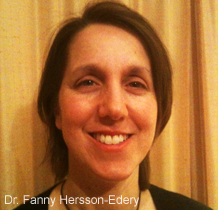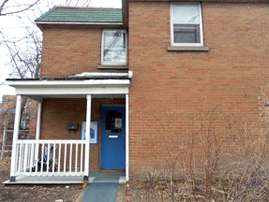Participez à la conversation!
... et contribuez à la valorisation de la MF
« MaisonBleue is a nonprofit organization founded by Dr. Vania Jimenez which, in conjunction with the CLSC, helps pregnant women with vulnerabilities, be it social, psychological or economical. »
An Interview with Dr. Fanny Hersson-Edery, Social Perinatal Care Physician
I met Dr. Hersson-Edery four years ago as my Osler fellow, leader of a small group of medical students throughout their training to cultivate physicianship skills. Her guidance and mentorship in the subsequent four years not only helped me develop a deeper understanding of a physician’s role as healer and professional, but also a further appreciation of family medicine. I was inspired by how passionate she was about her work, particularly her practice at Maison Bleue, a community perinatal clinic serving pregnant women with vulnerabilities.
 To start off, why did you choose family medicine?
To start off, why did you choose family medicine?
I had not actually done family medicine before I chose it because it was one of my last rotations. I remember I enjoyed a variety of specialties, including surgery, obstetrics, and internal medicine. Then I said to myself: I am sure family medicine would be a good fit for me because of its variety and flexibility. It is the kind of practice I can see change with me as I grew older and as my interests evolved. Looking back, I remember that I also applied to social work at the same time as medicine, which indicates to me that I was always drawn to patients’ stories and enjoyed helping them with not only the medical aspect, but also more comprehensively. That probably speaks to why family medicine is a good fit for me.
What is your practice like now?
I have a large prenatal practice, one of them is at a community clinic consisting of high volume prenatal care and following many of the children after delivery, as well as a general practice. My second prenatal practice is at Maison Bleue which is a social perinatal clinic. I am also part of a family medicine group of accoucheurs and am on call for obstetrics 3-4 times a month.
There are some areas of medicine that I don’t have time to undertake but can still follow through supervision and teaching. For example, I do homecare supervision in the geriatric population, teach residents and medical students at the Hertzl clinic and participate in the education of the maternal-child fellowship program of McGill University. It is difficult to choose your practice in family medicine because there are so many things you can do, and sometimes you may feel like you’re not “keeping up.” However, you have to tell yourself that it’s alright to do what you really like rather than everything or what you think you should do.
Can you tell us more about MaisonBleue?
MaisonBleue is a nonprofit organization founded by Dr. Vania Jimenez which, in conjunction with the CLSC, helps pregnant women with vulnerabilities, be it social, psychological or economical. It was first opened for women in the Cote-des-Neiges area, and there is a second one that recently opened in Park-Extension. The patient may be a recent immigrant with little family in Montreal trying to find her feet, or a second or third generation immigrant with vulnerabilities in her own context. It is really exciting for me to be in a group environment where we examine the patient’s needs, work towards meeting them, and provide much better care for the women because of it. The medical aspect is just a small part of it all.
What is your job like at Maison Bleue?
We have three physicians who work with a core team consisting of a social worker, nurse and midwife. I am involved in both individual medical visits and group prenatal care, such as pre- and post-natal classes, parenting and simulation classes, as well as discussions about racism and life as an immigrant. I work closely with the midwife, and we follow around 7 to 8 women for 5 to 6 months before delivery. We teach them how to take their blood pressure, measure their weight, and interpret urine dipstick results. As a group, we measure their abdomen and listen to the babies’ hearts. There’s also time set aside to engage in various discussions, from contraception and STIs to psychosocial issues. Most of the women’s children are delivered by the family physicians, and some can be done by the midwives if they so choose. The nurse will follow most of the families after the deliveries. I see them depending on the health needs of the patients, and we follow the kids for up to 5 years of age.
What do you enjoy the most about this job?
I have always appreciated working with a vulnerable population. I love finding creative solutions to meet the needs of these women. Follow-up appointments outside of Maison Bleue can be difficult for them, and you can really meet their needs in a speedier fashion. I also enjoy helping the women build their knowledge, constructing a support system, and empowering them as individuals and mothers.
For students interested in this area, what attributes should they cultivate?
There needs to be a sense of humility, which can be manifested through an interest to work with and learn from others. It is also important to have a desire to know and invest in a vulnerable population on a more personal level. For students who want to affect change and know that they’re sharing it with others, the rewards are tremendous. For example, one of the highlights of Maison Bleue is that we had one woman who was supposed to be deported back to Guinea. We went to the immigration office, protested and obtained involvement of the media, spoke to the Minister of health, and managed to help her stay in Canada.
What would you say are the challenges?
My role is often going beyond the medical, for example, using my role as a physician for social justice, and advocating for these patients. It can be sometimes challenging for physicians if they are not doing purely “the medical” because they feel it’s not as valid.
Do you need or recommend any special training for your type of work?
Family medicine will train you adequately for this type of work, but I also encourage you to seek out opportunities related to social perinatal care. It may be shadowing physicians working in proximity to a vulnerable population, gaining exposure in social pediatrics or homecare, or working in STI clinics or at a CLSC.
Finally, do you have any advice for aspiring family physicians?
Follow your heart and pursue that which makes you excited and energized!

Interview by Lei Ma
Dans ce numéro
- À propos de nous
- Éditorial
- Espace FMOQ
- Espace CQMF
- Espace FMRQ
- Les variétés de pratique
Médecine esthétique
Santé voyage
Périnatalité
- Stage coup de coeurRoberval
- 4 UMF en vedette
Baie-des-Chaleurs
Charles-Lemoyne
Gatineau
Manicouagan
- GIMF
- Chronique techno
- Santé mentale
- On parle de nous !
Esthétique
 « C’est un autre type de médecine, puisque les clients paient pour des soins qui ne sont pas essentiels. Ils ont des problèmes qui ont une incidence sur leur qualité de vie, par exemple, et cherchent une solution fiable et des soins de qualité, prodigués par un médecin », explique Dre Blackburn. « C’est un contraste par rapport à la médecine d’urgence, fortement axée sur les soins essentiels, dans un contexte où la vie est parfois menacée. » +
« C’est un autre type de médecine, puisque les clients paient pour des soins qui ne sont pas essentiels. Ils ont des problèmes qui ont une incidence sur leur qualité de vie, par exemple, et cherchent une solution fiable et des soins de qualité, prodigués par un médecin », explique Dre Blackburn. « C’est un contraste par rapport à la médecine d’urgence, fortement axée sur les soins essentiels, dans un contexte où la vie est parfois menacée. » +
Variétés de pratique
Chaque numéro de Première ligne vous fait découvrir deux pratiques de la médecine familiale. Accédez aux modes de pratiques présentés dans les numéros précédents :
Recherche |
Missions humanitaires |
Soins palliatifs (en anglais) |
Santé publique |
Médecine du travail |
Le Groupe d'intervention médicale tactique
| La pédiatrie
| La petite chirurgie |
L'urgence
| Le bureau |
Les soins intensifs
| L'obstétrique

Maison bleue : We have three physicians who work with a core team consisting of a social worker, nurse and midwife.